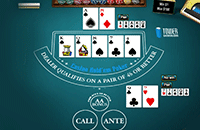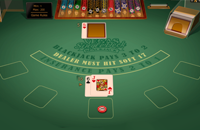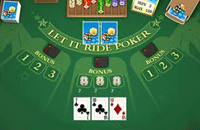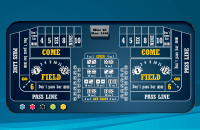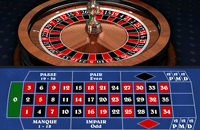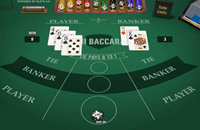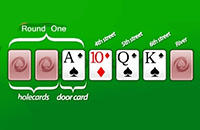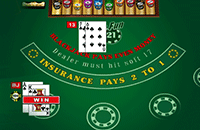Caribbean Stud Poker – Rules Strategy & Tips
Caribbean Stud Poker – also known as Casino Stud Poker is based on 5 Card Stud. There are a few differences between the two, the main one of which is that the Caribbean version is played directly against the casino itself instead of other players.
Although Caribbean Stud Poker is a fairly new game compared to some casino games, the exact origins of the game are unknown. Poker player David Sklansky made a claim that he was the creator, under the name Casino Poker back in 1982. The rules were slightly different, the main one being the dealer showed 2 cards upturned instead of 1. Several years after creation it was introduced at the King Casino in Aruba and a few minor changes were made to the rules as it became the version we see now.
Caribbean Stud Poker Rules
Like most casino table games, you buy in with chips and the first thing you need to do is to decide how much to bet.
It is important to note at this point that there are 2 bets in a game of Caribbean Stud Poker, therefore the initial bet should be half of what you are prepared to bet every hand.
Although you play directly against the casino, other players can be playing in the same game but you don’t need to worry about their hand or beat them in order to win.
To start, you need to place an Ante bet in the relevant spot on the table. These are placed by all players involved in the hand prior to any cards being dealt.
There is normally a progressive jackpot option as well, the equivalent of a side-bet, you can place a separate bet for this as well if you want.
All players and the dealer are then dealt 5 cards. All player cards are dealt face down and you are unable to discuss any cards with other players. One of the five dealer cards is dealt face up.
At this point in the hand, you have the only choice to make during the game – Raise (sometimes just referred to as Bet) or Fold.
If you choose to Fold, you will be out of the hand, your Ante Bet and any Jackpot Bet is lost.
If you choose to Raise, you will need to place a further bet equal to your Ante bet.
If you stay in the hand, once you place your Raise Bet the actions chosen by you are over and the Dealer will then turn over their 4 remaining downturned cards.
In order to ‘Qualify’, the Dealer must have at least a Pair or higher or an Ace-King in their hand if they don’t have at least a Pair.
Therefore, the worst hand a Dealer needs in order to Qualify is an A, K, 2, 3 and 4.
The best hand they could have where they don’t Qualify would be A, Q, J, 10 and 9.
When the Dealer does not Qualify, any Players left in the hand win even money on the Ante Bet but the Raise Bet would Push. If the Dealer does not qualify, it does not matter what the strength of the Players hand is.
If the Dealer’s hand beats the Players hand, then both the Ante Bet and Raise Bet are lost.
If the Dealer has at least an Ace and King and therefore qualifies, their hand is compared to that of any Players left.
Should the Dealer’s hand be better, both the Ante Bet and Raise Bet will lose.
If the hands are identical then both the Ante Bet and Raise Bet push and money will be returned.
If the Player hand beats the Dealer’s hand, the Ante Bet pays out even money.
The Raise Bet Paytable
Please note that the below is a fairly standard payout table that you will find in the majority of Casinos, some may vary a small amount however so it is worth checking so you get at least the below returns before deciding where to play.
| Payout | Hand |
|---|---|
| 100 – 1 | Royal Flush |
| 50 – 1 | Straight Flush |
| 20 – 1 | 4 of a Kind |
| 7 – 1 | Full House |
| 5 – 1 | Flush |
| 4 – 1 | Straight |
| 3 – 1 | 3 of a Kind |
| 2 – 1 | 2 Pair |
| 1 – 1 | Everything Else |
The Progressive Jackpot payouts can also vary, but you will normally find it pays out 100% if you have a Royal Flush and 10% of the Jackpot amount if you have a Straight Flush. Any other hand is a loser when it comes to the Progressive Jackpot.
A typical example of the layout for a Caribbean Stud Poker table when playing online is shown below:
The Ante bet is $10, and $1 for the Jackpot bet. Now you have your 5 cards and you can see 1 of the upturned Dealer cards, and you need to decide whether to Fold or Bet, this would be a further $10, the same as your Ante bet.
Strategy
Without knowing more than just 1 of the Dealers card, it isn’t easy to put together a strategy that increases your chances of winning by much.
We would recommend that you make a Raise Bet every time you have a Pair or higher.
We also recommend that you Fold if you have less than Ace, King – the hand the Dealer requires in order to Qualify.
If you have Ace-King yourself, this is the tricky part about whether to Bet or Fold. If you have 3 fairly high cards on top of the Ace and King, you should Raise, the same as if the Dealers upturned card is a Jack or lower and matches one of your cards – this makes it less likely the Dealer will hit a Pair.
The House Edge for following the above strategy is 5.22%.
Caribbean Stud Poker Tips
The average House Edge when playing the Progressive Jackpot is 26.46% and should, therefore, be avoided. Yes, there is a chance to win big and it is therefore tempting but you will lose whilst playing it in the long run.
When deciding on your budget for a session on Caribbean Stud Poker, remember that you need to make 2 bets in order to stay in the hand. Therefore, whilst we would normally suggest you split your budget into 40 bets, for Caribbean Stud Poker, this would need to be 80 bets to ensure you have enough for 40 hands.
Don’t bet more you can afford – this is the same for any casino game and will ensure you play your best. You won’t do this if you are worried about losing the money you are betting with and are much more likely to lose.
Enjoy your play. Casino games should be about enjoyment first and foremost, as well as the challenge of winning against the house. If you are not enjoying a game or are worried about losing then walk away.
Related Poker Articles:
Top Real Money Poker Sites
How to Play Red Dog Poker(Yablon)
Razz Poker Strategy

